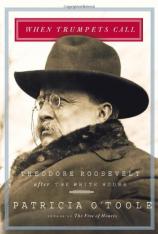When Trumpets Call: Theodore Roosevelt After the White House
Review
When Trumpets Call: Theodore Roosevelt After the White House
The formerly powerful face a difficult readjustment when they leave
their offices. Their individual characters dictate exactly how
complicated this transition will be, and we learn a lot about such
people by studying how they cope. In WHEN TRUMPETS CALL, Patricia
O'Toole examines the last years of the life of Theodore
Roosevelt.
Writer, explorer, naturalist, devoted family man, human dynamo, and
twenty-sixth president of the United States, Theodore Roosevelt was
only fifty years old when he completed his two terms of office and
had ten years of his life left to fill. He went out on a high note,
sure that his personally chosen successor, William Howard Taft,
would continue the progressive agenda Roosevelt's two Republican
administrations had put in place.
Hoping to avoid the appearance of dictating policy to the new
president, Roosevelt distanced himself as far from Washington as he
possibly could. He spent his first year out of office on safari in
Africa with his son, Kermit. One of the real pleasures of WHEN
TRUMPETS CALL is that, because so much of it is drawn from the
correspondence of Roosevelt's family and friends, we get vivid
portraits of all his intimates, including his sons, who had real
challenges in keeping up with their father.
Returning to the United States, it was apparent that Taft would not
uphold Roosevelt's progressive work. Remembered as one of our most
mediocre presidents, the Taft administration served the interests
of big business whenever it could, foiling Roosevelt's legacy.
Roosevelt claimed to act out of a sense of duty. He felt
responsible that he had chosen an unworthy successor and saw no
other way to rectify the situation than to regain the presidency
himself. Although his sense of duty was one of the best and
strongest elements of Roosevelt's character, he also found the
redemption of his lost power to be irresistible.
He formed the Bull Moose Party and split the Republican vote,
allowing Democrat Woodrow Wilson to win the presidency. In
Roosevelt's criticism of Taft and Wilson, we see the small side of
a big man. In print and public speeches, he carped about every
decision they made, from Taft's lazy corporate coddling to Wilson's
procrastination about entering World War I. Roosevelt's petulance
lost him his audience, and by the time the United States had
entered World War I, Wilson saw no reason to include Roosevelt in
the war effort.
For a man who took such well-deserved pride in his usefulness,
sidelining was a painful insult. Unfortunately, World War I had
other blows in store for him. First, he watched his sons go off to
war and participate as he could not. Then, his youngest son,
Quentin, was shot out of the sky and killed. The Roosevelt
philosophy of strenuous service turned back on itself, and
Roosevelt never seemed to recover from his loss.
Patricia O'Toole has written a sensitive, sophisticated study of a
great man at a vulnerable time. Although there are many books on
Theodore Roosevelt, WHEN TRUMPETS CALL is an essential volume for
those who really want to know the man.
Reviewed by Colleen Quinn (CQuinn9368@yahoo.com) on January 24, 2011
When Trumpets Call: Theodore Roosevelt After the White House
- Publication Date: March 1, 2005
- Genres: Biography, Nonfiction
- Hardcover: 512 pages
- Publisher: Simon & Schuster
- ISBN-10: 0684864770
- ISBN-13: 9780684864778




